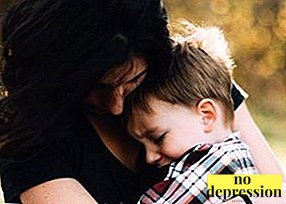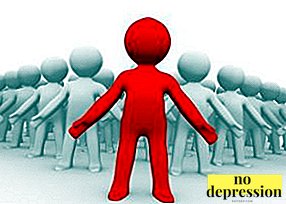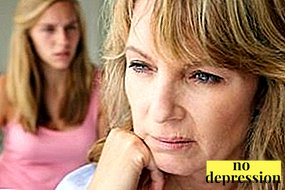Very often parents, trying to surround their child with care and attention, make a big mistake.
They fully control the baby, preventing any manifestation of independence.
What it is: synonyms and antonyms

Hyper-Pharmacy - is a model of parental behavior in which the child is subject to total control.
Adults surround their children with increased care and attention, protecting it not only from dangers, but also from real life in all its manifestations.
Scientifically, hyperopia is called "Hyperprotection". The term means over-protection and excessive protection, which adversely affects the object of hyper-protection.
Oversight (hypopeca) is the opposite concept of hyperthyroidism. And if the lack of elementary attention and control is more common in dysfunctional families, then hyperprotection is peculiar to prosperous and even “successful” families.
Causes and psychology
Excessive custody is the result of an increased level of anxiety in parents. Subsequently, the alarm is transmitted to the children, who mirror the psychological problems of the parents.
Women are more prone to hyperprotection, than men. However, there are cases of total control by each of the parents (especially if the family has an only child, a long-awaited child, there was a precedent of child death or injury).

Causes of hyperprotection:
- suspiciousness (constant feeling of impending disaster and rich imagination that reproduces pictures of a fall, a child’s illness, etc.);
- perfectionism (the desire to be perfect in the role of the parents and raise the most accommodating, intelligent and honest child through full control of the life and actions of the baby);
- self-realization through the child (when a parent cannot embody his ideas and realize his personal potential, the child and his upbringing are the only available “creative sphere”;
- the blame (the parent does not have true love for his child and tries to compensate or redeem it with total care and care);
- inability to adapt (the baby grows, but parents still perceive it as a defenseless and demanding absolute parental care);
- problems in personal life (If an adult does not have friends and a partner on whom he can project his love and tenderness, the only object for adoration and care becomes a child who receives a “killer dose” of attention).
How and in what way does hyperopia appear?
Mother over son

Abnormal motherwhose hyper-care applies to sons tend to limit the healthy activity of the child, prohibiting housework from the "female" category.
They believe that cooking, cleaning and washing is not a man’s occupation.
Therefore, the son is completely released from domestic work.
As a result, the child not formed self-care skills and elementary provision of decent living conditions.
Mother too actively intervenes in privacy son, criticizes or approves of his girls (and sometimes she even tries to find a worthy companion for the child), tries to influence his choice.
Moms over daughter
Hyperprotection over the daughter is manifested in the desire to extend the period of the “innocence” of the child in all senses of this concept.
The girl is restricted not allowing her to do things normal for her age (go on dates, children's discos, birthdays, long walks, evening sports and creative sections, etc.).
At the same time, a mother can indulge her daughter's “feminine” whims, buying her dolls, clothes, cosmetics and other things. upon request.
Grandmothers

Grandmothers who take excessive care tend to criticize the behavior of their adult children.
They scold them for being independent, identify behavior errors and try to fix everything.
This is especially noticeable during the contact between grandma and grandchildren. The grandmother begins to disguise the child, berating the son or daughter who dressed the baby too lightly, prepares him a “normal” meal, “correctly” erases the handkerchiefs, etc.
Parents over adult children
Parents who raised a child sometimes cannot accept the idea that the child is really ready for independent living. Therefore mom / dad begin to interfere in all areas of the child's life.
And since the control over an adult child is partially lost even in the case of hyperprotection (especially if the son / daughter lives separately), the parents' desire to participate in the choice of “fateful decisions” for the child is exacerbated.
Tips about work, school, friends and second half must be strictly followed, or in the course will go manipulations.
Mother-in-law

The overprotection of the mother-in-law is complicated by the fact that rights to care for a grown-up child have to be shared with his wife.
Hence a feeling of jealousy, attempts to eliminate competition, resentment, manipulation, and other attributes of opposition.
Son while gets a huge dose of care, because the mother wants to prove that only she can provide her child with a decent existence.
Hypertreatment is very vividly shown in the work “Undersight”, where you can track not only the signs, but also the consequences of this phenomenon.
Varieties
There are two types of hyper-care, in which children opposite characters are formed.
Both types are equally destructive for the child and his independence, but at the same time they form different psychological attitudes and character traits.
Conniving

Parents love their baby and raise it to idol status.
Such children grow up to be white-skinned, since adults remove them from any labor.
Mother and father actively convince the kid in his exclusivityadmire the beauty and talents.
Any whims of the crumbs are instantly satisfied. Parents do not hesitate to involve relatives and friends in this, demanding from them worship and adoration of the child.
As a result, the subject of hyperprotection high self-esteem is formed, misconceptions about their talents, the need for universal acceptance and dependence on people who will serve both basic needs and whims.
Adequate feedback with the child about the arising problems is completely absent, and if the child was unsuccessful in something, his caring parents blame the whole world for this, but not his own child.
Dominant
Child deprived of the right to their own opinion and will. Any decisions are made for him (from buying ice cream in a store to choosing a husband / wife). And if an indulgent hyperprotection is about the momentary fulfill the whims, then the dominant hyper-care is about the impossibility of embodying these whims.

The child is a doll in the hands of parents and his wishes, interests, needs are simply ignored, considering this to be childish stupidity and unconsciousness.
The child is not praised to prepare for a cruel reality.
But at the same time, he is not allowed to make independent decisions, because only parents know what experience the baby just needs to go through, and what experience is too early.
What causes: consequences
What is dangerous over-care, as a type of parenting? Very often mother's hyper-care detrimental to the child, inhibits its development.
Hyperprotection leads to the fact that the ability to independently solve emerging problems simply atrophies.
The object of excessive care becomes so accustomed that for it the other "suppliers of comfort" always make the choice that can't make decisions and analyze the situation.
In addition to lack of independence, hyperprotection provokes other developmental distortions. Mother protects the child from physical activity and sports, for fear of injury. As a result, the kid spends his childhood at the computer, earning scoliosis and excess weight.

Also, parents feel sorry for the child who is tired at school, solving math problems for him and reading the works for retelling aloud.
As a result baby thinks and reads worst of all in class.
At the same time, adults stubbornly assert that other children simply cannot boast of anything else, or their teachers are unreasonably kind / sorry for them. Those. the student is also formed an exaggerated view of his own person.
The opposite situation is the inflated demands on the child and the desire to turn him into an ideal and accommodating baby. Perfectionism parents have damaging effects on the emotional health of the child.
So girls who do not have the talent for dancing are given to ballet schools. Naturally, parents impose an exaggerated demand on them, but babies, due to their physical data, cannot comply. Hence the pressure, manipulation, constant stress, recycling and health problems.
Complications
Complications begin to manifest themselves mainly in adolescence and adulthood in the form of affective disorders, neurosis, problems with social adaptation, inability to build relationships with others, lack of independence, uncertainty and evasion of choice.
In the later stages of personality development, a hysterical type of character is formed in the adolescent, which leads to protest, scandals, attempts to run away from home, etc.
How to get rid: tips of psychologists

Hyperprotection Correction should start with parents.
To do this, use several effective methods:
- Counseling psychologist (parents are told about the types of education and how each of these types affects the child and its development).
- Cognitive-behavioral therapy (specialist works with parents, eliminating uncertainty, anxiety, negative attitudes and other conditions that provoke increased attention and care towards the child).
- Family therapy (The specialist “leads” the child and parents beyond the usual interaction model through various trainings, exercises and techniques to develop a new relationship strategy).
Very important so that the parent realizes the problem and is ready to work with her. Otherwise, the correction of hyper-care will be ineffective and the only effective method of dealing with obsessive care will be creating a barrier between the child and the mother / father.
And this is possible only if the children have already grown up and have the opportunity to protect themselves from the constant attention of relatives.
Hyper-Pharmacy - it is always a painful form of love. Even if it is covered with good intentions, its action has destructive consequences. Therefore, it is important to give the child the opportunity to get the necessary life experience, make mistakes and make difficult decisions.
Consequences of hyperopia in childhood:



